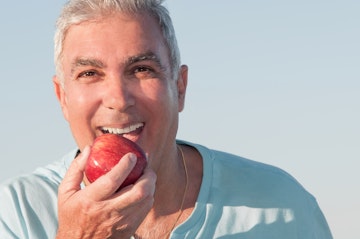Why snacks could be playing havoc with your teeth

Children’s diets are constantly in the news, but what about adults – how much sugar are we actually consuming every day?
Sugar has crept more and more into our diets through an increase in processed foods – and as our choice of snacks has got sweeter and sweeter.
Experts recommend that anyone over the age of 11 should limit their sugar intake to 30 grams a day – about 7 sugar cubes. However, the average person gets through almost 60 grams of added sugar a day, with teenagers consuming even more.
While eating this level could have serious health repercussions, it will also play havoc with your teeth as sugar is the main cause of decay and cavities; fuelling harmful bacteria that attacks enamel.
Why is sugar such a problem?
The way we eat sweet snacks as a nation has certainly changed, with lower prices and larger servings, and a huge array of choice it is difficult to avoid chocolate and sweets. It makes a cheap, easy, convenient snack and is quite often the only choice when out and about.
The problem is eating sugary snacks has now become routine – cakes in the office, ice cream at the park, biscuits with tea, muffins for breakfast, and monster bags of chocolate in front of the TV at night – never mind this all being washed down with fizzy drinks.
And we can’t get enough of it. The ‘high’ eating sugar brings is quickly replaced by a crash, leaving us craving more sugar.
This onslaught of sugary snacks is bad news for our teeth as it continues to damage enamel.
What are the alternatives?
Snacking is the main culprit as teeth cannot cope with the constant attacks. So, while a bit of sugar is ok at mealtimes, try to cut sugary snacks out of your diet where possible.
Drink coffee, tea, water, or milk instead of fizzy drinks and snack on sugar-free foods, or those only containing naturally occurring sugar such as:
- Nuts
- Cheese
- Boiled eggs
- Humus and carrot sticks
- Meat
- Crab sticks
- Fruit
It may be hard at first to cut back on sugar, but once a new snacking routine has been established things will fall into place. If you’re in need of some motivation, just think about protecting your teeth.
If you have any concerns about enamel erosion or cavities in your teeth contact Bhandal Dental Practice today.
Call us now to make an appointment


Hear from our
happy patients
These are just some of the kind words about our practice, direct from our incredible patients.









